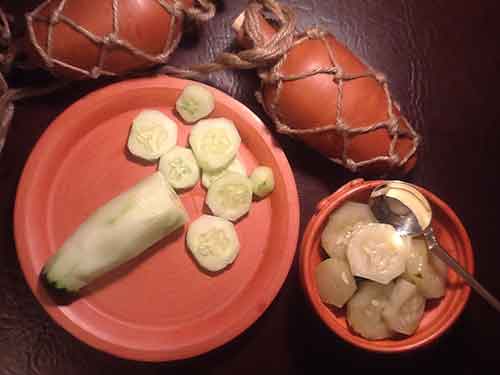Braised cucumbers
(Cucumeres)

by Gaius Plinius Secundus, Historia Naturalis, XX 6
Review by Lucius Sallustius Plautus: The Braised cucumbers were interesting... Like most ancient recipes, Pliny doesn't give exact measurements nor cook times for his recipe, therefore a lot is left up to personal taste and experience. The first step is to thoroughly peel your cucumbers. This is a very important step and should not be overlooked, if you leave this step out the cucumber skin will turn an odd shade of green and will taste bitter. I performed this recipe with two cucumbers but if really shouldn't matter too much as long as you consistently and evenly stir them as the cook.
After peeling the cucumbers should be sliced. Again, Pliny gives us no clue on how hey should be sliced, whether in strips, in coins, or even diced. I personally went with a cucumber coin cut, each slice being no larger than a quarter of an inch. This is not to say that it can't be cooked in any other slice shape. The ingredients for the broth are olive oil, vinegar, and honey. No salt should be added if you would want to stay true to the recipe, salt is usually mentioned specifically if it is needed in a recipe. Quite frankly, it doesn't need it, especially the taste profile that it produces. Semi-equal parts of oil and vinegar (I used red wine vinegar, others are acceptable) should be put in a pan and about a tablespoon or less of honey.
Bring the mixture up to a light boil, making sure to stir every so often. Throw on your cucumbers. Don't worry if it appears there is not even liquid in the pan, cucumbers hold a substantial amount of water that will be drawn out as they cook. Make sure to stir so that the broth completely costs every slice. Make sure not to over cook the cucumbers, they will become soggy, mushy, and discolored if you do. However you still want to sweat them enough that the become soft. These can be served hot or cold.
The end result resembles a sweet bread-and-butter pickle, so much so that I would have to say that these can be labeled as ancient pickles. The only reason they would not be similar to a pickle is because they are not produced through a pickling process and there is no salt mentioned.
Something to remember: The Romans did not always use the same names or varieties of ingredients as we do today... To them, "corn" was wheat, not the maize we refer to today. Another example would be cucumbers — not the green vegetable we think of today, but instead the Cucumis Melo, of the Cucurbitaceae family popularly known as the "Santa Claus", "Christmas", or "Toadskin" melon. If you can get them, great! If not, just use a regular cucomber until you can. No one will judge you.
Original recipe: Coctos deraso cortice ex oleo et aceto ac melle iucundiores esse certum est.
Translation: When scraped and cooked in olive oil, vinegar and honey, cucumbers are without doubt more delicious.
(Serves four as a side dish)
Cook’s notes
- Resist the temptation to add more of the liquids than the recipe calls for at first. The cooking will pull a lot of juice out of the cucumber, and you can end up with the slices swimming in a watery sauce. This recipe has been tried with both peeled and unpeeled cucumbers; the peeled version, as described by Pliny, is definitely better.
Ingredients
- 1 large cucumber (Really, they used the Cucumis melo or Santa Claus melon, as cucumbers come from the New World)
- 3 tbsp white wine vinegar
- 3 tbsp olive oil
- 1 tbsp clear honey
- Sea salt (optional)
Preparation
- Cut the cucumber into thick slices.
- Pour the white wine vinegar, olive oil, and honey into a heavy pan and cook the slices of cucumber gently in the sauce until they are tender, shaking the pan occasionally to redistribute the cucumber slices and ensure even cooking.
- Serve hot as a side dish.



















